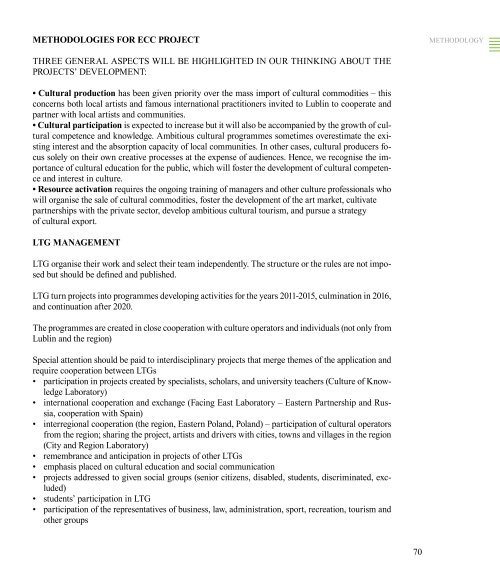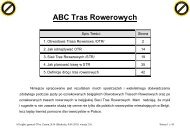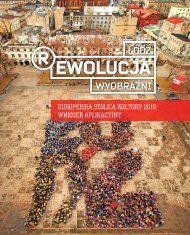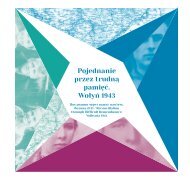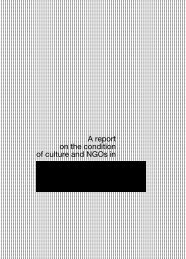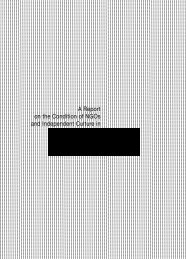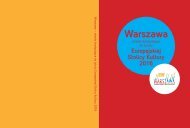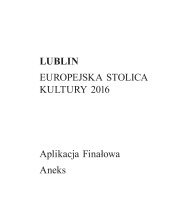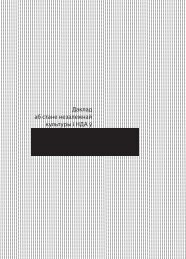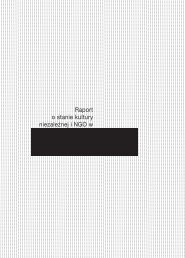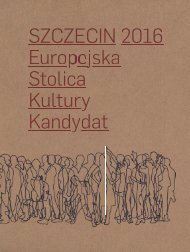Lublin 2016 â Appendix - Kultura Enter
Lublin 2016 â Appendix - Kultura Enter
Lublin 2016 â Appendix - Kultura Enter
Create successful ePaper yourself
Turn your PDF publications into a flip-book with our unique Google optimized e-Paper software.
Methodologies for ECC project<br />
methodology<br />
THREE GENERAL ASPECTS WILL BE HIGHLIGHTED IN OUR THINKING ABOUT THE<br />
PROJECTS’ DEVELOPMENT:<br />
• Cultural production has been given priority over the mass import of cultural commodities – this<br />
concerns both local artists and famous international practitioners invited to <strong>Lublin</strong> to cooperate and<br />
partner with local artists and communities.<br />
• Cultural participation is expected to increase but it will also be accompanied by the growth of cultural<br />
competence and knowledge. Ambitious cultural programmes sometimes overestimate the existing<br />
interest and the absorption capacity of local communities. In other cases, cultural producers focus<br />
solely on their own creative processes at the expense of audiences. Hence, we recognise the importance<br />
of cultural education for the public, which will foster the development of cultural competence<br />
and interest in culture.<br />
• Resource activation requires the ongoing training of managers and other culture professionals who<br />
will organise the sale of cultural commodities, foster the development of the art market, cultivate<br />
partnerships with the private sector, develop ambitious cultural tourism, and pursue a strategy<br />
of cultural export.<br />
LTG management<br />
LTG organise their work and select their team independently. The structure or the rules are not imposed<br />
but should be defined and published.<br />
LTG turn projects into programmes developing activities for the years 2011-2015, culmination in <strong>2016</strong>,<br />
and continuation after 2020.<br />
The programmes are created in close cooperation with culture operators and individuals (not only from<br />
<strong>Lublin</strong> and the region)<br />
Special attention should be paid to interdisciplinary projects that merge themes of the application and<br />
require cooperation between LTGs<br />
• participation in projects created by specialists, scholars, and university teachers (Culture of Knowledge<br />
Laboratory)<br />
• international cooperation and exchange (Facing East Laboratory – Eastern Partnership and Russia,<br />
cooperation with Spain)<br />
• interregional cooperation (the region, Eastern Poland, Poland) – participation of cultural operators<br />
from the region; sharing the project, artists and drivers with cities, towns and villages in the region<br />
(City and Region Laboratory)<br />
• remembrance and anticipation in projects of other LTGs<br />
• emphasis placed on cultural education and social communication<br />
• projects addressed to given social groups (senior citizens, disabled, students, discriminated, excluded)<br />
• students’ participation in LTG<br />
• participation of the representatives of business, law, administration, sport, recreation, tourism and<br />
other groups<br />
70


